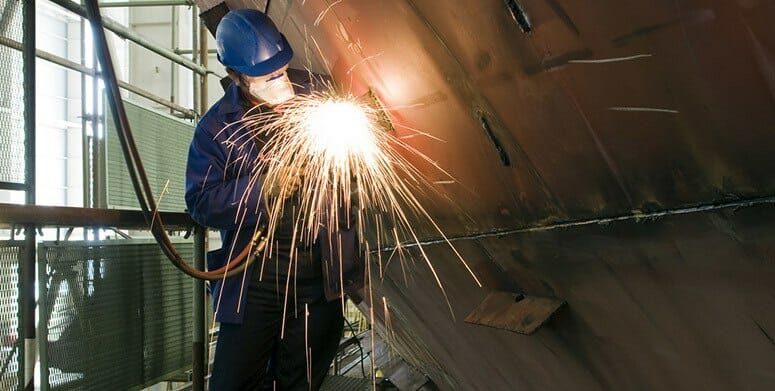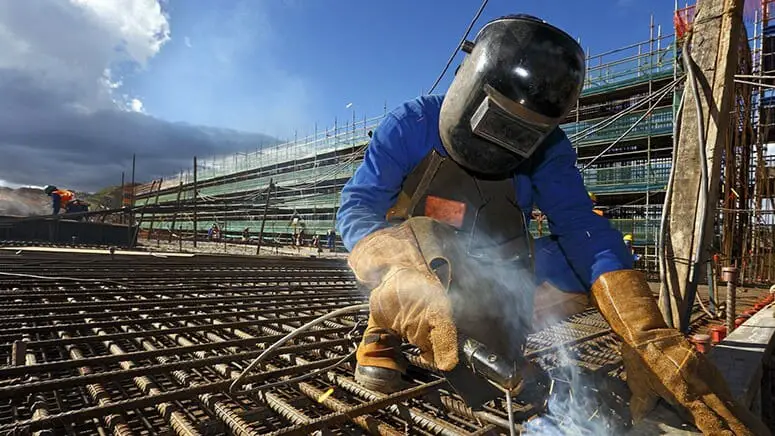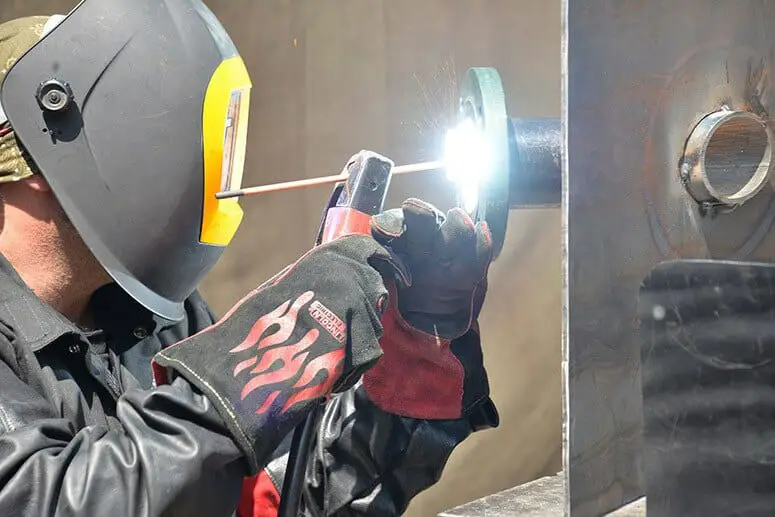Welding is considered an essential skill that is necessary in many industries worldwide.
The strength of fusing metal pieces together through the welding process is superior to other forms of joining such as bolting or riveting.
Since a failed weld to cause a catastrophic accident, welding is a skill that requires training and frequent evaluation.
In this article we'll cover 15 of the best types of welding careers.
Welding Offers Great Variety
Welders who keep up to date on the latest technology and can get certified are in high demand with employers.
Additionally, welding skills are highly transferrable among employers and states. Once you are certified in one state, it is relatively easy to work in any other state. Welding skills are also transferrable among industries because the basic skills are the same across the board.
There are few industries where welding is not involved in some part of their process.
The best Welding careers are in industrial processes, construction, ship- and boat-building, auto manufacturing and repair, agricultural equipment, industrial maintenance and repair, oil and gas pipelines and a host of other industries.

Some of the welding careers available for welders include: Welder, assembler, machine operator, construction or manufacturing welding technicians or supervisors, welding inspector, engineer, robotics repair and maintenance, technical sales, project management and specialized welding areas.
A certified welder can be trained in vocational or online welding classes and employed in as little as 7 months in almost any state in the U.S.
There are numerous welding career opportunities for a certified welder to move up into higher paying jobs. Usually, this is without a lot of additional schooling.
Let’s look at some different types of jobs that are available for welders.
Here are the main types of welding careers:
1. Welding Jobs That Require Travel
There are no geographic or atmospheric restrictions to where a welding job can be located.
Pipelines require underwater welders; military transport and weapons require welders in desert and mountainous areas.
Cable and satellite companies require welders that travel in space. Cruise lines, racing teams, and industrial factories also utilize welders and can be located anywhere in the world.
Welders that have specialized training and are willing to travel can earn serious money while seeing the world.
2. Underwater Welding
Welding underwater is a specialized field , as it also requires instruction in diving. Underwater welders are often required to perform fitting and rigging, non-destructive testing and inspection, underwater photography and underwater cutting with heavy equipment.
So most underwater welders must possess a n AWS D3.6 welding skill and pass a physical exam. Underwater welders are in high demand in the oil & gas pipeline industry as well as in naval and shipyard industries in North America.
Commercial divers and underwater welders have a mean (average) hourly wage of $26.32, while the mean annual wage is approximately $54,75, according to the Bureau of Labor Statistics.
If that’s not enough, remember that the top 10% of underwelder welders can make around $93,910 or more. [1]
3. Military Support
The U.S. military has operations all over the world.
Welders are needed to maintain, build and repair the metal weapons, facilities and vehicles that are used to support troops. Military support welders can be located at local military bases or travel overseas to areas that can often be dangerous.
Military support welders’ salaries can get up to $160,000 a year or more, due to the danger and risk involved in the job.
4. Industrial Shutdown Welding
Welders who work on industrial shutdowns are those that work for a specific company in a specific industry and travel from plant to plant.
They work to shut plants down temporarily while industrial welds on industrial pipes are inspected and repaired to keep the facility in top operating order.
A job at any given plant can last anywhere from a week to several months depending on the size of the plant and the extent of the work.
Examples of typical industries that an industrial shutdown welder would work in include oil & gas refineries, chemical, power generation, water and industrial production plants.
A factory shutdown welder can easily make a salary averaging $34 to $35 per hour - $71,620 to $175,000 annually. They live and work on the road six months out of the year with few days off. An added bonus to this job is that they take time off the other six months out of the year.
5. Shipbuilding And Repair
Welders that build, inspect and repair ship welds on military vessels, cargo ships, research vessels etc. travel from one shipyard to another in different ports throughout the world to fulfill a contract.
They often live in communities made up of the welders that work at the shipyard. They typically will travel from shipyard to shipyard.
A job at any given shipyard can last anywhere from a month to several years depending on the size of the contract to be fulfilled. The welder could be involved in building new ships or repairing existing ships.
Because welders in this type of profession are constantly traveling, the pay is very lucrative. According to the Bureau of Labor Statistics, welders working in the ship- and boat-building industry can earn $22.35 per hour or an average of $46,480 per year. [2]
6. Onboard Ship Maintenance And Repair
Most cruise lines and passenger ships have welders that live on the ship as a permanent part of the crew while it travels to all of its worldwide destinations.
With the number of passengers on board, these ships must be impeccably maintained and any necessary repairs must be completed while the ship is at sea.
Passenger ship welders receive a lot of perks in addition to a high salary and worldwide travel. They are provided free room and board, meals and access to all of the amenities the passengers can enjoy in their spare time.
7. Motorsports
Welders are integral members of NASCAR and other motor sport racing team pit crews. They travel the country wherever their racing team goes.
For most motorsports, everything in the car or bike is made of metal and has to be custom made. In addition to building the cars and bikes, welders are needed to repair and maintain the vehicles.
At high speeds a weld failure can be critical, thus welders on motorsport racing teams require specialized training and are well-paid.
8. Pipelines
Oil & gasoline companies, natural gas companies, and electric and water utilities all require pipelines to transport their products throughout the U.S and the world. Welders that work on these conduits travel extensively to remote places in order to build and repair pipelines.
Welders in this specialized niche of welding usually live and work at the job site and are in high demand. The work is physically demanding and can often be dangerous. Job contracts on a pipeline can run from a few weeks to six months or longer.
Welders on industrial pipelines can make good money and travel. Welders working on a pipeline can expect an average salary of $31.09 per hour or upwards of $62,000 per year with relative job security. [2]
10. Local Welding Jobs
If staying in one place is more your style or you have other obligations keeping you close to home, there’s still tons of options for welders.
11. Construction
Welding is an essential process in the construction industry.
Thousands of welders are needed in building and bridge or civil engineering construction projects where metal I-beams are used extensively to erect large commercial buildings and highway bridges.
Welders that work on these types of projects take on a significant amount of risk as they often work hundreds of feet in the air on outdoor construction platforms. In this industry, welders can earn $18.86 per hour or an average of $39,230 per year. [2]
12. Manufacturing
According to the Bureau of Labor Statistics, the majority of the over 316,000 welders in the U.S. are employed in the manufacturing industry.
Manufacturing encompasses much more than the automotive and truck industry. It includes any industry that makes products primarily out of metals.
Manufacturing includes a wide range of industries that require equipment and metal gadgets and gears including agriculture, mining, landscaping, telecommunications and more.
According to the Bureau of Labor Statistics, Welders that work in manufacturing can earn between $$18.37 to $19.26 per hour or an average of $38,200 to $40,070 per year. [2]
13. Boilermakers
“Boilermakers” are experienced welders that work producing steel parts and pipes from plates and tubes.
They work on bridges, blast furnaces, power generation plants, ship construction, engineering projects, commercial factories and more. They are employed to repair, re-pipe and re-tube commercial steam and hot water pipes, boiler tanks and the like.
Welders that work in boiler, tank and shipping container manufacturing earn around $19.39 per hour or an average of $40,300 per year. [2]
14. Industrial Maintenance
Every industry utilizes machinery and equipment and facilities. Welders are required to maintain and repair the machines, equipment and facilities on a regular basis so production can run continuously. Welders working in industrial maintenance usually live locally and do not need to travel.
According to the Bureau of Labor Statistics, a welder in industrial maintenance can expect an average salary of $20.24 per hour or $42,090 per year. [2]
15. Oil Rigs
Industries such as oil and gas require work on a stationary oil rig offshore. Oil rigs both drill for oil and maintain oil reserves.
Welders working on oil rigs work for long periods of time elapsing before you set foot off of the oil rig as they live and work there for months on end. Welders working on an oil rig can expect a salary in excess of $62,000 per year.
We include it in “local” jobs because you’re usually living close and staying in one place. But at the same time, it does requires being away from home for extended periods of time.
Earnings Opportunities
The annual pay scale for welders nationwide ranges from $24,490 to $55,240. Of course, this varies widely by industry and location.
Many earn a bit less, and some earn far more, as you’ve seen with the specialty industries above. The average welder salary, though, is about $35,920 a year.
If you get certified, you’ll usually end up on the higher end of the payscale, since you’ve shown more competence. [3]
The future is bright for those in the employed in the welding profession. Nationwide employment opportunities for welders is expected to rise at an average rate of 3-4% per year through 2024.
Wages can be pretty nice depending on the welding certification type and welding level and location of the job. It is not uncommon for a certified welder to earn $35 per hour or more. A certified welder that is willing to travel and work in hazardous conditions can earn over $100K per year. [2]
There is a need for welders in both stationary locations and locations that require constant travel.
Whatever your life stage and family situation, welding is a career that can offer you consistent, stable work in a manufacturing plant/warehouse or the adventure of traveling around the country or overseas from job site to job site.
Footnotes
[1] https://www.commercialdivingacademy.com/underwater-welding-career-and-salary.cms
[2] https://www.bls.gov/oes/current/oes514121.htm
[3] https://work.chron.com/pay-scale-certified-welding-2149.html









